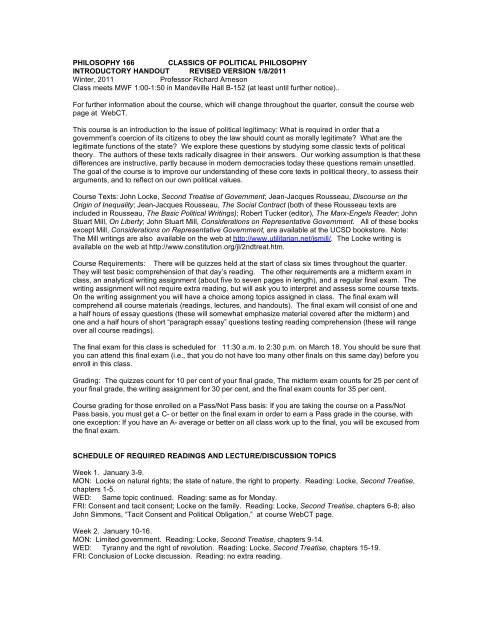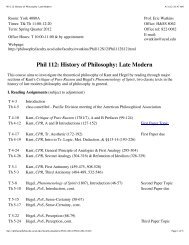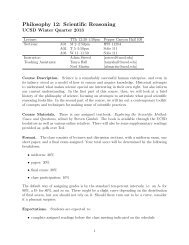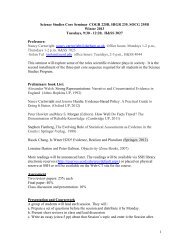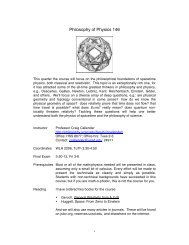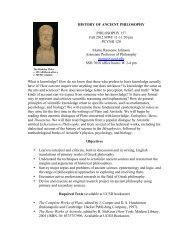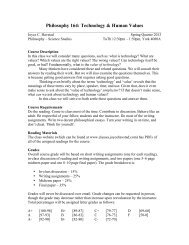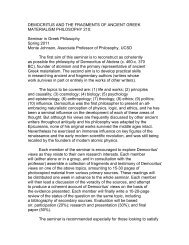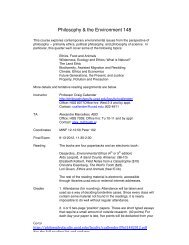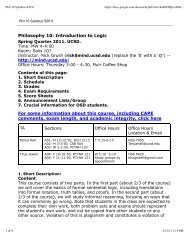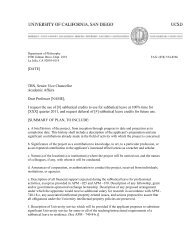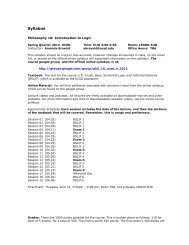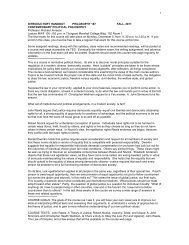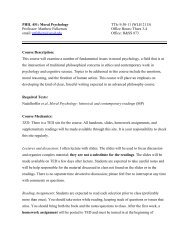philosophy 166 classics of political philosophy introductory - UCSD ...
philosophy 166 classics of political philosophy introductory - UCSD ...
philosophy 166 classics of political philosophy introductory - UCSD ...
You also want an ePaper? Increase the reach of your titles
YUMPU automatically turns print PDFs into web optimized ePapers that Google loves.
PHILOSOPHY <strong>166</strong> CLASSICS OF POLITICAL PHILOSOPHYINTRODUCTORY HANDOUT REVISED VERSION 1/8/2011Winter, 2011Pr<strong>of</strong>essor Richard ArnesonClass meets MWF 1:00-1:50 in Mandeville Hall B-152 (at least until further notice)..For further information about the course, which will change throughout the quarter, consult the course webpage at WebCT.This course is an introduction to the issue <strong>of</strong> <strong>political</strong> legitimacy: What is required in order that agovernment’s coercion <strong>of</strong> its citizens to obey the law should count as morally legitimate? What are thelegitimate functions <strong>of</strong> the state? We explore these questions by studying some classic texts <strong>of</strong> <strong>political</strong>theory. The authors <strong>of</strong> these texts radically disagree in their answers. Our working assumption is that thesedifferences are instructive, partly because in modern democracies today these questions remain unsettled.The goal <strong>of</strong> the course is to improve our understanding <strong>of</strong> these core texts in <strong>political</strong> theory, to assess theirarguments, and to reflect on our own <strong>political</strong> values.Course Texts: John Locke, Second Treatise <strong>of</strong> Government; Jean-Jacques Rousseau, Discourse on theOrigin <strong>of</strong> Inequality; Jean-Jacques Rousseau, The Social Contract (both <strong>of</strong> these Rousseau texts areincluded in Rousseau, The Basic Political Writings); Robert Tucker (editor), The Marx-Engels Reader; JohnStuart Mill, On Liberty; John Stuart Mill, Considerations on Representative Government. All <strong>of</strong> these booksexcept Mill, Considerations on Representative Government, are available at the <strong>UCSD</strong> bookstore. Note:The Mill writings are also available on the web at http://www.utilitarian.net/jsmill/. The Locke writing isavailable on the web at http://www.constitution.org/jl/2ndtreat.htm.Course Requirements: There will be quizzes held at the start <strong>of</strong> class six times throughout the quarter.They will test basic comprehension <strong>of</strong> that day’s reading. The other requirements are a midterm exam inclass, an analytical writing assignment (about five to seven pages in length), and a regular final exam. Thewriting assignment will not require extra reading, but will ask you to interpret and assess some course texts.On the writing assignment you will have a choice among topics assigned in class. The final exam willcomprehend all course materials (readings, lectures, and handouts). The final exam will consist <strong>of</strong> one anda half hours <strong>of</strong> essay questions (these will somewhat emphasize material covered after the midterm) andone and a half hours <strong>of</strong> short “paragraph essay” questions testing reading comprehension (these will rangeover all course readings).The final exam for this class is scheduled for 11:30 a.m. to 2:30 p.m. on March 18. You should be sure thatyou can attend this final exam (i.e., that you do not have too many other finals on this same day) before youenroll in this class.Grading: The quizzes count for 10 per cent <strong>of</strong> your final grade, The midterm exam counts for 25 per cent <strong>of</strong>your final grade, the writing assignment for 30 per cent, and the final exam counts for 35 per cent.Course grading for those enrolled on a Pass/Not Pass basis: If you are taking the course on a Pass/NotPass basis, you must get a C- or better on the final exam in order to earn a Pass grade in the course, withone exception: If you have an A- average or better on all class work up to the final, you will be excused fromthe final exam.SCHEDULE OF REQUIRED READINGS AND LECTURE/DISCUSSION TOPICSWeek 1. January 3-9.MON: Locke on natural rights; the state <strong>of</strong> nature, the right to property. Reading: Locke, Second Treatise,chapters 1-5.WED: Same topic continued. Reading: same as for Monday.FRI: Consent and tacit consent; Locke on the family. Reading: Locke, Second Treatise, chapters 6-8; alsoJohn Simmons, “Tacit Consent and Political Obligation,” at course WebCT page.Week 2. January 10-16.MON: Limited government. Reading: Locke, Second Treatise, chapters 9-14.WED: Tyranny and the right <strong>of</strong> revolution. Reading: Locke, Second Treatise, chapters 15-19.FRI: Conclusion <strong>of</strong> Locke discussion. Reading: no extra reading.
2Week 3. January 17-23.MON: NO CLASS. MARTIN LUTHER KING HOLIDAY.WED: Natural man. Reading: Rousseau, Discourse on the Origin <strong>of</strong> Inequality, Part I (pages 23-60 in TheBasic Political Writings), plus Rousseau’s notes to Part I.FRI: The founding <strong>of</strong> civil society. Reading: Rousseau, Discourse on the Origin <strong>of</strong> Inequality, Part II(pages 60-81 in The Basic Political Writings), plus Rousseau’s notes to Part II.Week 4. January 24-30.MON: The Social Contract. Reading: Rousseau, The Social Contract, Book I. Recommended reading:Joshua Cohen, Rousseau: A Free Community <strong>of</strong> Equals, chapters 1 & 2.WED: The general will. Reading: Rousseau, The Social Contract, Book II; also Frederick Neuhouser,“Freedom, Dependence, and the General Will,” available at course web page.FRI: Government and direct democracy. Reading: Rousseau, Rousseau, The Social Contract, Book III.Week 5. January 31-February 6.MON: Rousseau: liberal, radical democrat, or totalitarian? Reading: Rousseau, The Social Contract,Book IV.WED: MIDTERM EXAM IN CLASS.FRI: Karl Marx on alienated labor. Reading: Marx, “Economic and Philosophic Manuscripts <strong>of</strong> 1844,”sections on “Estranged Labour” and “Private Property and Communism,” in Marx-Engels Reader.Recommended reading: excerpt from “Hard Work,” chapter 6 <strong>of</strong> his Spheres <strong>of</strong> Justice, available at courseweb page.Week 6. February 7-13.MON: Marx versus money and exchange. Reading: Marx, “Economic and Philosophic Manuscripts <strong>of</strong>1844,” sections on “The Meaning <strong>of</strong> Human Requirements” and “The Power <strong>of</strong> Money in Bourgeois Society,”in Marx-Engels Reader. Recommended reading: Michael Walzer, excerpt from “Money and Commodities,”chapter 4 <strong>of</strong> his Spheres <strong>of</strong> Justice., available at course WebCt page.WED: Historical materialism. Reading: “Manifesto <strong>of</strong> the Communist Party,” in Marx-Engels Reader.FRI: [PLEASE NOTE—THIS CLASS HAS TO BE RESCHEDULED.] Marx’s amoralism. Reading:“Manifesto <strong>of</strong> the Communist Party”; also handout excerpt from “Preface” to the Critique <strong>of</strong> PoliticalEconomy; also Allen Wood, “The Marxian Critique <strong>of</strong> Justice,” available at course WebCT page.Week 7. February 14-20MON: Exploitation. Reading: “Wage Labour and Capital,” in Marx-Engels Reader.WED: Communist revolution; the stages <strong>of</strong> communism. Reading: Marx, “Critique <strong>of</strong> the Gotha Program,”in Marx-Engels Reader. Recommended reading: G. A. Cohen, “Why Not Socialism?”, available at courseWebCt site.FRI: Communism and democracy. Reading: Introduction and Part III <strong>of</strong> “The Civil War in France”, in Marx-Engels Reader.Week 8. February 21-27.MON: NO CLASS. PRESIDENTS’ DAY.WED: Mill’s utilitarianism. Reading: handout excerpt from Mill, Utilitarianism, chapter 2. Recommended:Mill, On Liberty, chapter 1.FRI: Utilitarian liberalism; the liberty principle; Mill versus paternalism. Reading: Mill, On Liberty, chapter 1.Available at http://www.utilitarian.net/jsmill/Week 9. February 28- March 6.MON: Individuality and liberty. Reading: Mill, On Liberty, chapter 3. (Chapter 2 <strong>of</strong> On Liberty isrecommended but not required.)WED: WRITING ASSIGNMENT DUE IN CLASS. Direct and indirect harm to others. Reading: Mill, OnLiberty, chapters 4 and 5.FRI: Mill on the limits <strong>of</strong> laissez-faire. Reading: Mill, Principles <strong>of</strong> Political Economy, Book V, ch. 11. Athttp://www.utilitarian.net/jsmill/Week 10. March 7-13.MON: Mill on the stationary state and the future <strong>of</strong> capitalist wage labor. Reading: Mill, Principles <strong>of</strong> PoliticalEconomy, Book IV, ch. 7, sections 1-6 (but skip all <strong>of</strong> the details Mill reports about contemporary coops; insections 5 and 6). Further recommended BUT NOT required reading: Mill, Chapters on Socialism, chapter
34, “The Difficulties <strong>of</strong> Socialism, “ pp. 1-9—stop at the subheading, “The Idea <strong>of</strong> Private Property not Fixedbut Variable.”. At Mill web site listed for last Monday.WED: Mill on representative government. Reading: Mill. Considerations on Representative Government,chapters 2-3. At Mill web site.FRI: Mill on democracy and plural votes. Reading: Mill, Considerations on Representative Government,chapters 6, and 8. . At Mill web site.Arneson’s <strong>of</strong>fice hours: Mondays 3-4 and Tuesdays 2-3 and in HSS 8057.Arneson’s email: rarneson@ucsd.edu


